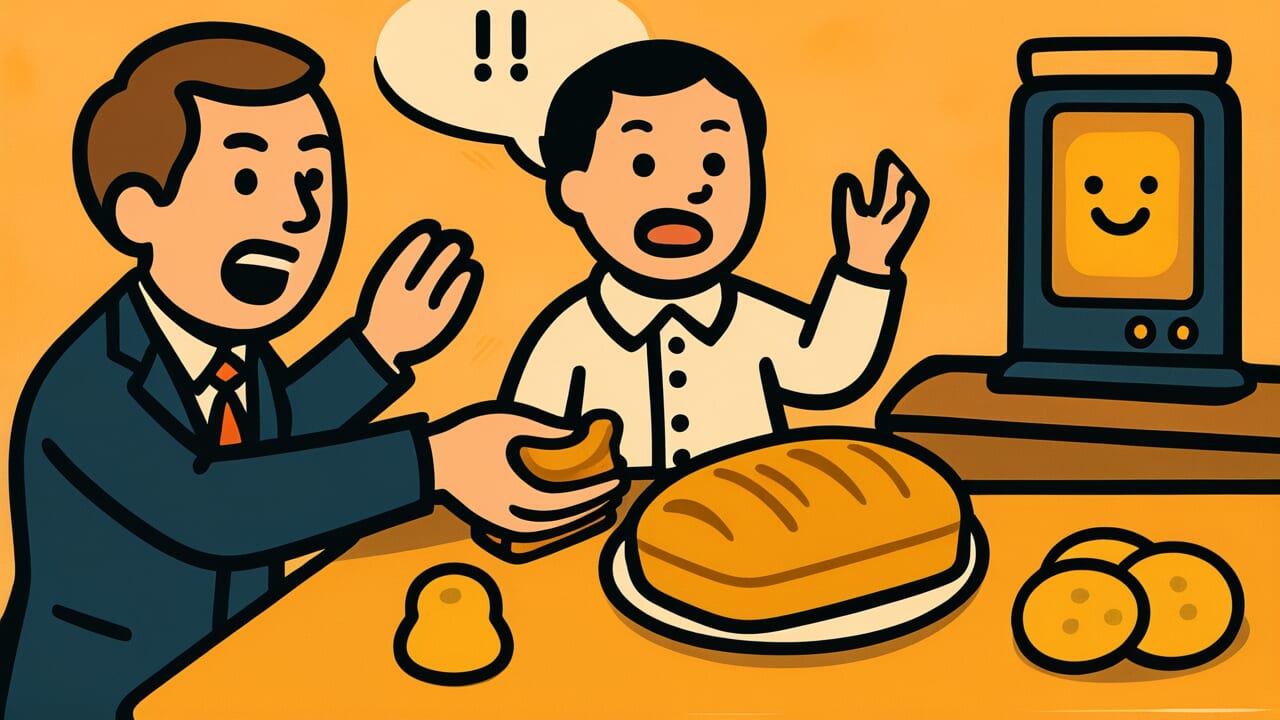How to Read “Do not quarrel with your bread and butter”
Do not quarrel with your bread and butter
[Do not KWAR-uhl with your bred and BUT-er]
All words use standard pronunciation.
Meaning of “Do not quarrel with your bread and butter”
Simply put, this proverb means you should not fight with or criticize the source of your income.
The literal words paint a clear picture. Bread and butter represent basic food that keeps you alive. Quarreling means arguing or fighting. So the saying warns against biting the hand that feeds you. Your livelihood deserves respect, even when it frustrates you.
This wisdom applies to many modern situations. Workers might feel tempted to criticize their boss publicly. Business owners might want to argue with their biggest customers. Students might consider insulting teachers who control their grades. The proverb suggests these actions could backfire badly.
What makes this saying powerful is its honest recognition of dependency. Most people rely on something or someone for survival. Pride and anger can make us forget this basic truth. The proverb reminds us that some relationships are too important to damage through unnecessary conflict.
Origin and Etymology
The exact origin of this proverb is unknown, though it appears in English collections from the 1600s onward. Early versions sometimes used slightly different wording but carried the same essential meaning. The phrase reflects a time when bread and butter were truly basic survival foods for most people.
During earlier centuries, employment was often more personal and direct than today. Workers lived closer to their employers and depended heavily on single sources of income. Losing a job could mean genuine hunger for entire families. This harsh reality made the wisdom especially relevant and memorable.
The saying spread through oral tradition and printed collections of proverbs. It appeared in various forms across English-speaking regions. Over time, the meaning expanded beyond just employment to include any important source of support or benefit. The core message remained unchanged even as economic systems evolved.
Interesting Facts
The phrase “bread and butter” as a term for livelihood dates back several centuries in English. Bread was the most basic food staple, while butter represented a small luxury that made plain bread more pleasant. Together, they symbolized the minimum needed for decent survival.
This proverb uses food metaphors, which appear frequently in wisdom sayings across many languages. Food represents survival in the most basic sense, making these metaphors instantly understandable to people throughout history.
Usage Examples
- Manager to employee: “I know the client can be difficult, but they’re our biggest account – do not quarrel with your bread and butter.”
- Mother to teenage son: “Yes, your boss is demanding, but you need this job for college – do not quarrel with your bread and butter.”
Universal Wisdom
This proverb reveals a fundamental tension in human nature between pride and survival. People naturally want to express their opinions and defend their dignity. Yet they also need security and resources to live. These two drives often conflict, creating situations where wisdom must override emotion.
The saying reflects an ancient understanding of power dynamics. Those who control resources hold significant influence over those who need them. This reality exists in families, workplaces, and societies throughout history. Recognizing this imbalance is not about accepting unfairness, but about understanding consequences before acting.
What makes this wisdom endure is its recognition of strategic thinking in relationships. Humans are social creatures who must navigate complex webs of dependency. Sometimes the most powerful response to frustration is patience rather than confrontation. This does not mean accepting abuse or never standing up for principles. Instead, it suggests choosing battles carefully and timing actions wisely. The proverb acknowledges that survival often requires swallowing pride temporarily while working toward better long-term solutions.
When AI Hears This
Humans develop a strange blindness toward their most reliable support systems. The more dependable something becomes, the more invisible it grows in their minds. They stop noticing their steady job, loyal customers, or reliable income source. This creates a dangerous gap between what sustains them and what they consciously value.
This blindness happens because human brains are wired to notice changes and threats. Stable, predictable resources fade into mental background noise like familiar sounds. People literally forget how much they depend on these quiet foundations. Their attention shifts to exciting new opportunities while ignoring existing lifelines.
What fascinates me is how this flaw might actually protect humans sometimes. By taking reliable resources for granted, people free up mental energy for growth. They can pursue bold dreams precisely because they unconsciously trust their safety net. This dangerous forgetfulness paradoxically enables both spectacular failures and remarkable achievements in human life.
Lessons for Today
Living with this wisdom requires developing emotional intelligence about when to speak and when to stay quiet. The challenge lies in distinguishing between situations that truly threaten your livelihood and those that simply bruise your ego. Learning this difference can save careers, relationships, and opportunities.
In personal relationships, this wisdom applies to family members who provide support, mentors who open doors, and friends who offer help during difficult times. Recognizing these dependencies does not mean becoming a doormat. Rather, it means approaching conflicts with extra care and consideration. Sometimes a gentle conversation works better than a heated argument.
The broader lesson involves understanding that most people face some version of this dilemma. Everyone depends on others in various ways, whether for income, emotional support, or practical help. Accepting this reality with grace rather than resentment can lead to more effective problem-solving. When issues do need addressing, approaching them strategically rather than emotionally often produces better results. The goal is not to avoid all conflict, but to engage in it thoughtfully when the stakes are high.


Comments